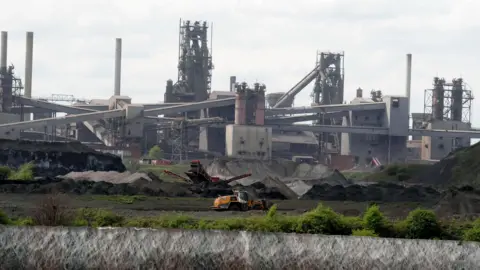Wood takeover - good news or another loss for Scottish business?
 WOOD
WOODWood was a global engineering giant built from girders.
It grew out of a fishing boat repair yard after Sir Ian Wood, the son of the owner, went on a visit to Texas early in the 1970s and realised how big Aberdeen's offshore industry was about to become.
Under Sir Ian, it grew by winning contracts and buying companies, reaching a stock market valuation above £5bn ($6.5bn).
But a risky acquisition of a US rival meant it took on more than it could handle.
Its board is now recommending a £242m ($318m) offer from Dubai-based Sidara is accepted.
As an oil services company, Wood did not require the risk capital for drilling, nor did it get the bumper profits that went to others who did.
However, it did extremely well out of providing the engineering services for that drilling, including design, operations, and maintenance.
At its peak, it employed more than 50,000 people around the world.
When Sir Ian retired as chairman in 2012, his successors continued to expand and tried to reduce dependence on oil and gas.
But the deal for AMEC Foster Wheeler, a US rival in the same line of work, which carried heavy liabilities, proved a step too far.
According to an external investigation of the company, corporate governance has gone awry.
Wood's accounts for last year have been stalled and its share price has fallen from a peak of £9 ($11.85), when oil prices were high in 2013, to just 28p ($0.37).
With very large debts falling due next year, and the conditions for those debts being broken this year, other options have been considered.
According to its directors though, those options do not look as attractive as the Sidara bid, offering £242m to buy the shares and £340m ($448m) in injected capital.
 Google
GoogleSuch a deal can work for a company like Wood, and its many staff. The two sides of the negotiation say that a takeover would give workers the chance to work across the Sidara divisions.
With more robust finances, it has a wider reach into Sidara's existing client base and geographic spread.
So it may grow, and this may turn out to be good news - or at least better news than the company being broken up.
If this deal goes ahead with the support of both boards and Wood shareholders - and allowing for cautious legal language, that now looks likely to happen - it means the loss of another major Scottish company into the hands of a foreign owner.
That is a loss in high earners and in supply contracts, for lawyers, marketers, consultants and auditors, as well as local printers, caterers and recipients of sponsorship.
In recent decades, Scotland has had several corporate giants that became global players or could have.
But for various reasons, they were sold or that promise faded away, taking corporate power with it.
 Getty Images
Getty ImagesScottish & Newcastle Breweries was one, broken up and shared between Heineken and other rivals. Before that, much of the whisky distilling industry was merged, controversially, into Diageo.
Halifax Bank of Scotland, or HBOS, became part of Lloyds Banking Group, while the financial crisis of 2008 saw the sprawling ambition of Royal Bank of Scotland humbled and power shift to London.
Other Scottish financial brands disappeared into international ownership: Scottish Mutual, Scottish Provident, Scottish Widows and TSB.
Standard Life merged with Aberdeen Asset Management, and has been through a tortuous evolution of diminishing scale. Clydesdale Bank, based in Glasgow, became part of Virgin Money and now Nationwide.
Stagecoach and FirstGroup have been big players in transport, not just in Britain but in American coaches and school buses.
However, one was sold to a German investment fund, and First, based in Aberdeen, has been pared back.
Bus-builder Alexander Dennis was resurrected by Scottish investors and sold to a Canadian transport firm.
In newer technology, Skyscanner found a Chinese buyer. Online gambling start-up FanDuel was taken over in a deal which left its founders with little to show for its huge American success, and a legal case they're pursuing.
While SSE stands out as a Scottish-headquartered company that's growing and with international ambitions, its Glasgow-based rival - and also a former nationalised energy supplier - Scottish Power was bought by Iberdrola of Spain nearly 20 years ago.
It offers a positive story of a headquarters role that is not only significant but with an international reach.
From Madrid, Iberdrola looks to Glasgow to do much of its wind power developing around the world.
Threat of losing control
The loss of headquarters is a long-running saga for the Scottish economy, which has stretched back throughout last century as well.
In an open economy tied to the London financial markets, firms have benefited from the opportunities to expand by acquiring firms elsewhere, but Scottish firms have also been vulnerable to takeover if they're weakened or under-valued.
And proprietors have opted to cash in rather than grow further.
What is changing is that London is also noticing the threat from losing headquarters control, particularly of industries that are being seen in the newly emerging world disorder as strategically significant.
Having the steel industry controlled from China and India is now seen as a significant problem.
 PA Media
PA MediaMuch of Britain's defence industry is controlled from the USA and France, while a lot depends on BAE Systems, which straddles the Atlantic.
The London Stock Exchange is struggling to retain its appeal as a place to raise funds. That is partly because technology has made it possible to broker finance with less use of exchanges, resulting in much less public transparency from those companies.
In government, the SNP has been reluctant to defend Scottish corporate champions in the way it did while in opposition.
In government at Westminster, Labour is slowly feeling its way towards a coherent industrial strategy, picking and boosting the industries of the future as well as defending those of strategic significance.
It risks only taking over those enterprises that are too big or important to fail or to shut down.
That wouldn't be much of a strategy.
